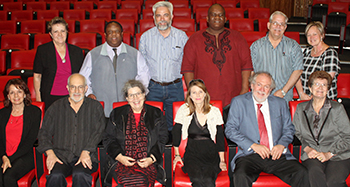Latest News Archive
Please select Category, Year, and then Month to display items
07 March 2024
Photo Lunga Luthuli
 Prof Francois Strydom, Senior Director at the Centre for Teaching and Learning and Simphiwe Kunene, the first African DREAM scholar and a master’s student from the Faculty of Education.
Prof Francois Strydom, Senior Director at the Centre for Teaching and Learning and Simphiwe Kunene, the first African DREAM scholar and a master’s student from the Faculty of Education.
The University of the Free State (UFS) received recognition for its commitment to student success at the 2024 Achieving the Dream (ATD) conference which celebrated its 20-year anniversary. Simphiwe Kunene, an Education master's student originally from the Qwaqwa campus, was selected to represent South Africa as the first DREAM scholar from Africa as part of the conference.
The Achieving the Dream network of over 300 institutions, which is one of the largest movements in US higher education aims to transform colleges and universities so that students of colour and a lower socio-economic status are supported to earn a degree. The UFS is a leading partner in the Siyaphumelela Network, which has been working for 10 years with ATD to enhance the success of students in South Africa. Prof Francois Strydom, Senior Director at the Centre of Teaching and Learning (CTL), accepted the award on behalf of the institution.
Prof Strydom said that collaboration with the ATD and Siyaphumelela institutions has helped the UFS to develop cutting-edge approaches to “level the playing field” and support Kovsies to earn their undergraduate degrees.
The first African DREAM scholar
Kunene was selected as the first African DREAM scholar from the Siyaphumelela network. To select the DREAM scholar, each Siyaphumelela partner institution nominated one student as a preferred candidate. From the proposed candidates, the DREAM scholar was selected by the South African Institute for Distance Education (Saide) based on the following: demonstrating resilience, academic excellence, and a deep commitment to making a positive difference in universities and personal communities.
He addressed the conference of over 2 000 delegates and shared with them his hopes and dreams. Many members of the South African delegation said Simphiwe did his country proud. He had the following to say about his opportunity to be a DREAM scholar: “Being a DREAM scholar was life changing for me, exposing me to an array of opportunities I never knew were possible and available for me. It was as if, for a moment, the world had stopped to just listen to what I had to say."
The way forward
The UFS will continue its work as a partner of the Siyaphumelela network for the 2024-2026 cycle. The multi-stakeholder project team is focused on enhancing undergraduate students’ time, and to position the UFS as a thought and research leader in the area of student success as part of Vision 130.
Special Edition of the Journal for New Generation Sciences launched at UFS
2016-10-26

Participants of the round-table discussion
at the launch of the Journal for New Generation
Sciences during the UFS Faculty of Education
colloquium which took place on 20 October 2016.
Photo: Oteng Mpete
The Journal for New Generation Sciences Special Edition was launched on 20 October 2016, at the Albert Wessels Auditorium, during the University of the Free State’s (UFS) Faculty of Education colloquium on the field of technological higher education and its contribution to the knowledge society.
Partnerships and knowledge production
Prof Laetus Lategan, Dean of Research and Innovation at the Central University of Technology (CUT), led the launch. “Higher education is not only about producing knowledge but it is also about fostering new relationships,” said Prof Lategan referring to CUT’s collaboration with the UFS Faculty of Education.
“Empowering people is important for capacity building, offering novice writers the opportunity to learn and a way to enhance their academic writing,” said Prof Lategan.
The Journal for New Generation Sciences is an accredited research publication in which scholars, internal and external to the institution, may publish. It accommodates national and international publications and showcases the university’s commitment to applied research.
Growing in leaps and bounds
According to Dr Somarie Holtzhausen, from the Faculty of Education’s School of Higher Education Studies, all papers are peer-reviewed by at least two experts. An editorial review also secures the quality of the paper. In 2014, when the journal was established, 30 contributions were submitted, although only 25 were successfully published.
“We turn down content not because it is not good, but unfortunately because it does not speak to the heart of the journal,” said Prof Lategan. With 60 peer reviewers, the journal’s contributors are assured that at least two peer reviewers will assess their article.
The Journal for New Generation Sciences supports both high-quality scholarly work of established researchers, and capacity building among new researchers.
During the round-table discussion various contributors to the journal spoke about their research and involvement in the publication of the journal.